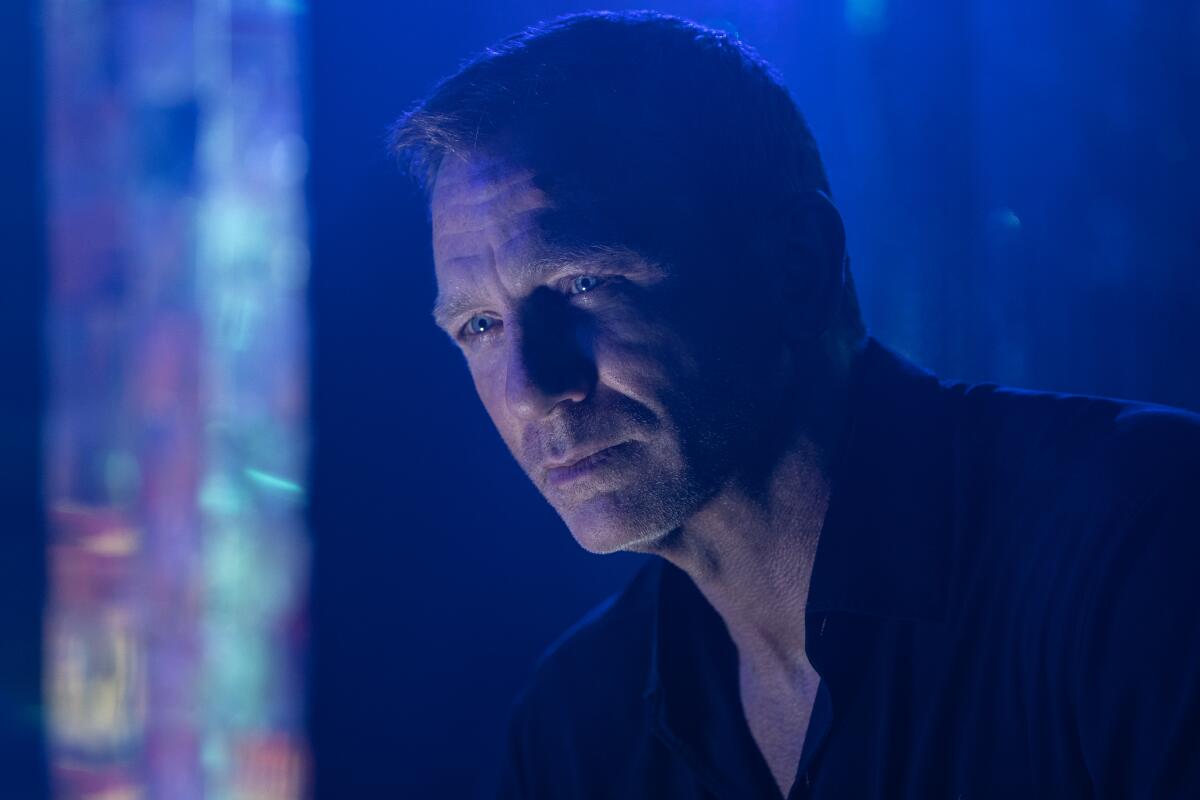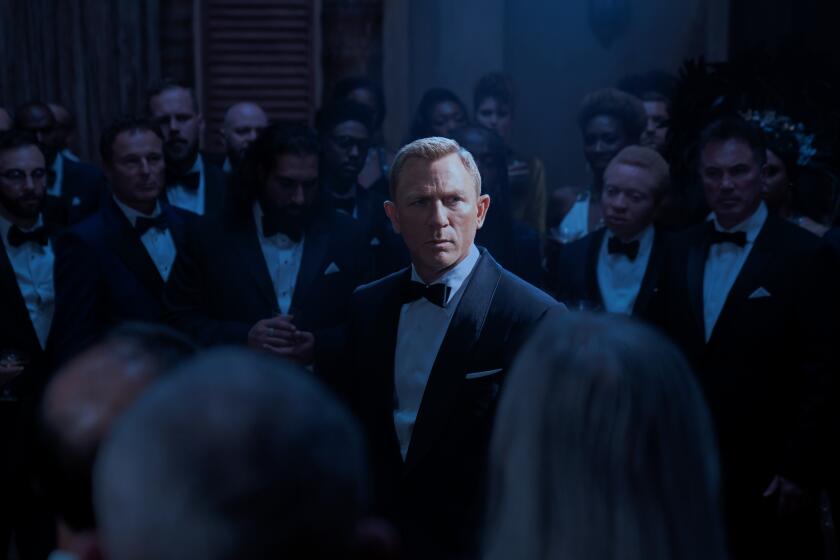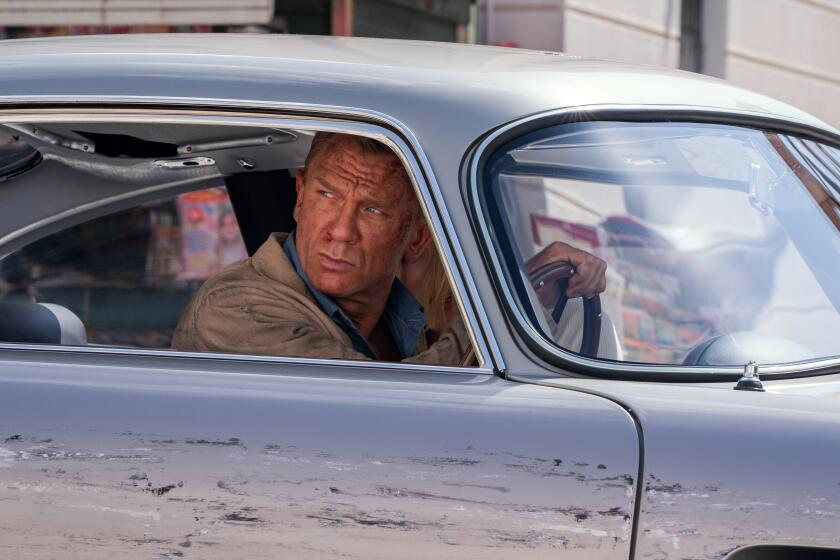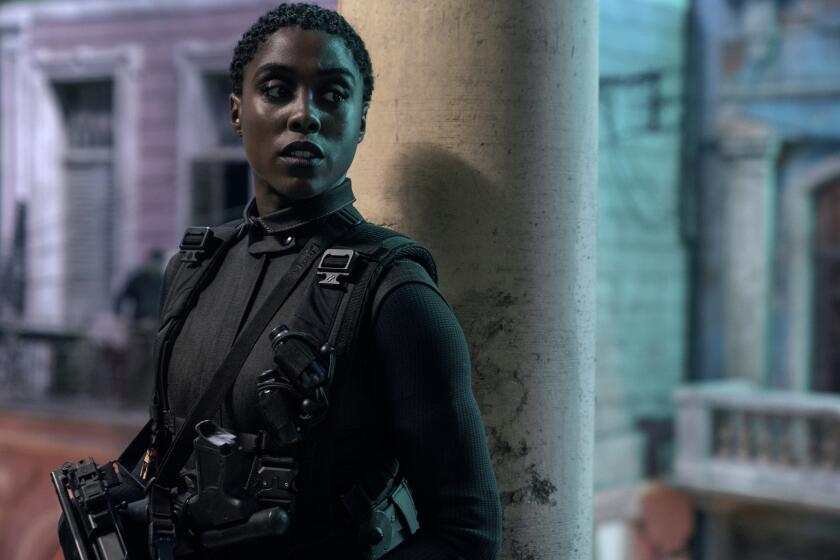‘No Time to Die’ says goodbye to James Bond, for now. Here’s what worked, and what didn’t

- Share via
So they really did it. They brought a definitive close to the Daniel Craig era in “No Time to Die.” How, exactly, will be discussed in the oh-so spoiler-filled conversation below. Two of The Times’ film writers, Justin Chang and Michael Ordoña, got together to mull over the end (was it a master stroke or a bludgeoning with a “blunt instrument”?) and possible beginnings, and ponder what it all means ... in the world of 007.
Final warning: Many spoilers for “No Time to Die” follow.
Justin Chang: So, who saw that coming? A lot of us, I’m guessing. Going into the long-delayed, amusingly titled “No Time to Die,” the death of Daniel Craig’s James Bond always seemed like a real possibility. Even before he signed up for this fifth and final installment, Craig had been signaling his readiness to move on from Bond for years, and indeed might well have done so sooner if his version of the character hadn’t been so justly acclaimed and popular. He likely wanted the assurance of finality, as well as an ending that would complete the character’s arc in stirring fashion, fulfilling the notes of heightened seriousness and emotional depth that he brought to “Casino Royale,” “Quantum of Solace,” “Skyfall” and “Spectre.” Mission accomplished.
Is it churlish of me, then, to confess that I wish I’d liked “No Time to Die” better? That I wanted to be as moved by Bond’s last moments on that lonely island, dragging his doomed, nanobot-ravaged body to the edge of a soon-to-be-blown-to-smithereens cliff, as I was by the wholly understandable creative impulse behind it? I’ll give the filmmakers credit for boldness: In a time when the broadest entertainments seem to be borrowing narrative cues from daytime television, what with Jon Snow and Sherlock Holmes and Michael Myers and half the Avengers all coming back to life, exercising your license to kill (and I mean really kill) your brand-defining leading man counts as a legitimately radical gesture.
And of course, Craig played that dying gasp as superbly as he’s played Bond all along, with magnetic stoicism and world-weary resignation. He is not, to put it mildly, the problem here. The problem is that all this doom-laden gravitas feels generic — and has felt generic, I would argue, since the end of “Casino Royale,” the first and still the best of the Craig Bonds. The impulse to shift Bond away from suave lady-killer mode and recast him as some kind of tortured romantic hero, while certainly interesting in theory, has not produced any particularly interesting movies. I’m well aware of my sacrilege, just as I’m aware that a lot of people consider that beautifully hollow shell “Skyfall” some kind of masterpiece. And as a general admirer of blockbuster seriousness (and its close twin, self-seriousness), I’m a bit surprised to find myself proposing franchise entertainment should “lighten up.”
But, seriously (or not so seriously): Lighten up, 007, and for the sake of variety, may your inevitable next incarnation be a breezier one. Michael, tell me how wrong I am. Did “No Time to Die” thrill and move you as much as you wanted it to?
Daniel Craig’s era as James Bond comes to a bittersweet, epic conclusion in ‘No Time to Die.’
Michael Ordoña: Well, I’ll not kneel at the churly temple to scarify you for not loving “No Time” (though I did, so you’re obviously wrong). No, really, I agree with what you said about “Casino” being best in show — I consider it the best spy movie I’ve ever seen — though I think I liked “Skyfall” more than you did. Just not as much as its reputation would demand. It’s the most visually beautiful of the series, that I’ll say, and Javier Bardem the most enjoyable villain.
As to “No Time,” I admired its action, thought Ana de Armas made quite a splash and hope she returns, and fervently hope Lashana Lynch‘s casting kicks down certain doors in the franchise. I didn’t love the villain Safin (Rami Malek); his motivations were less convincing than I’d like. One supposes the filmmakers felt they’d spent enough of the longest-ever Bond movie on the people and had better get to some shootouts. At least he wasn’t one of those “I want it all!” guys from earlier phases of the franchise.
That said, I found the very unusual amount of time spent on character and relationships in “No Time” rewarding. That seems as radical a choice for the premier spy mega-franchise as the choice to bomb Bond. It felt sincere, as if director and co-writer Cary Joji Fukunaga and company wanted to make a personal drama about (as our colleague Mark Olsen might put it) a man out of time. It’s something we haven’t seen in this series before, and I don’t know we’ll ever see again. Craig had to earn that from the Eon-Fleming production machine constructed to efficiently spit out human-relationship-free widgets whose grosses would still dependably triple their budgets, even during the bloat of the Pierce Brosnan years. Those were safe moneymakers; a hell of a lot safer than the heavily de-gadgeted and largely de-womanizered Craig years, which had the temerity to make a man — an actual, human, feeling man — out of Bond. And still somehow kept pace with the Marvel era of blockbuster-itis.
Which begs the question of what the future holds. More than any other mega-franchise but “Doctor Who,” Bond has become synonymous with rebirth. But apart from Christopher Nolan’s “Dark Knight” trilogy, there probably has never been such a blatant “end of saga; wait for the next incarnation” handoff as Bond’s end in “No Time to Die.” And in the Bat-trilogy, the hero cheated death. Here, the hero definitely, unquestionably takes a dirt nap, with a literal proclamation by the filmmakers that he’ll wake up as someone else: “James Bond will return.” So that’s different. Justin, do you see “No Time” as the outlier I do? Or not different enough, and you’re on to the next one?
Daniel Craig’s final James Bond adventure is a classic blend of fresh and familiar, and it arrives just as cinemas need it the most.
Chang: I thought of both Marvel and “The Dark Knight” trilogy, too, Michael — not because the Craig Bonds have been particularly imitative of either series, but because in their narrative continuity, they seem to have sprung from the same 21st-century blockbuster ethos. “No Time to Die” marks the culmination of the most sustained, serialized emotional arc that Bond has ever been given. The movies may have been self-enclosed capers as usual, but they were also more interconnected — by recurring villains (like Jesper Christensen’s Mr. White, an important figure in “Casino Royale,” “Quantum of Solace” and “Spectre”), and by the long shadow cast by the death of Eva Green’s Vesper Lynd, whose absence kickstarts the prologue of “No Time to Die.” Most of all, these movies have been held together by Bond’s inner life, his tortured memories and lingering regrets.
All of which sounds entirely laudable, even logical, on paper. And the fact that Craig has had no small part in directing Bond’s evolution — that he himself wanted to play a less cartoonish, more three-dimensional Bond — speaks to his ambition and an intrinsic understanding of his own strengths as an actor. I’m still trying to figure out why I find the project both admirable and faintly dubious. Could it be the usual revolving door of movie directors — the baton pass from Martin Campbell (“Casino Royale”) to Marc Forster (“Quantum of Solace”) to Sam Mendes (“Skyfall,” “Spectre”) and now to Fukunaga — which has lent a faintly mechanical, impersonal quality to the whole exercise? (That impersonal quality haunts most of the past Bonds, of course, but then, they weren’t trying to be personal.)
But to get back to “No Time to Die” specifically: I think some of my favorite moments this time involved Bond’s old colleagues Moneypenny (Naomie Harris), Q (Ben Whishaw) and M (Ralph Fiennes), which is a testament to the warmth these side characters have engendered over multiple movies. I’m with you and just about everyone else on how good De Armas is in her single sequence, which plays so well in part because it feels like a grand throwback to the witty, insouciant, less self-regarding Bond movies of old. I’m curious to see what the future holds for Lynch’s Nomi, who should at least be liberated from the annoyingly forced 007-vs.-007 rivalry they saddled her and Craig with.
And what about Bond, Mathilde Bond, the little (ahem) bond-le of joy who turns up late in the film and scampers her way through the movie’s explosive climax? Will we see her again, or is it just enough to know that while this Bond may be dead, his spirit still lives on? Did you, like me, roll your eyes a little when they decided to play that card — not to actually explore the admittedly fascinating question of what kind of father Bond would be, of course, but rather to shamelessly maximize the poignancy of his death?
Cary Fukunaga steps into directing the James Bond franchise with ‘No Time to Die,’ bringing his sophisticated sensibility to the emotional conclusion of Daniel Craig’s five-film run in the role.
Ordoña: I admit, I suspected we’d get a “Dark Knight Rises”-esque epilogue with the Bond brood living peacefully on some Mediterranean island, some hint of killer instinct in Mathilde waltzing in. I might have enjoyed that, pat though it might have been; I’m still not fully psychologically healed from a screen hero who helped define my childhood getting spread all over the ocean between Japan and Russia. As to eye-rolling, I was fine with the introduction of Baby Bond. It seemed in keeping with the theme of time moving forward with or without us. And it seemed meta, as Madeleine’s story time narration to her felt like the filmmakers telling us, “This is a story, and this is the end of this version of the story. There will be others.”
My psychic wounds aside, though I definitely enjoyed “No Time” more than you did and see it as more proof Fukunaga is the real deal (I would love to see him take a bubbly rom-com and turn it very, very dark — even “True Detective” Season 1 dark), I’m with you in that Bond’s detonation didn’t blow me away. To reference the MCU again, the death of Tony Stark — that’s how you do it. As the countless weeping audience reaction videos show, blockbuster cinema can, in fact, convey a powerful emotional and psychological experience to other people. I doubt there will be the same buckets of tears shed for this hero’s demise (perhaps fans will need no more than a quantum of solace?). Still, it serves its dramatic purpose and I appreciate it on those grounds.
But now that the franchise must move on, maybe it’s time to birth a Bondverse. Should the next Bond be Black, Asian, female, gay? I say no. Why not diversify the ranks of 00 agents instead? Let the next James Bond fit the general contours of the Fleming creation, and let his contrast with a mix of colleagues making the most of their own licenses to kill be commentary enough. Then we can get fresh characters without personalities chained to what we expect of Bond, James Bond. Heck, the first is already in place: Nomi, 00...8? And as Marvel has astutely realized, each of these sub-franchises could have a different cinematic signature — building to an Avengers-style mega-spy team-up movie. You’re welcome, Eon Productions.
Justin, are you willing to speculate about the franchise’s future? Perhaps throw out an actor-director combination you’d like to see?
Now that “No Time to Die” has officially had its world premiere, all your burning James Bond questions can be answered. (Without spoiling all the fun.)
Chang: Well, as one of the stone-hearted jerks who felt nothing in response to Tony Stark’s death — unless it was a feeling of gratitude that this phase of the interminable Avengers enterprise, at least, had finally run its course — I don’t think anything good would come of emulating the Marvel way of doing things. In that spirit, I must say I find the idea of a Bondverse horrific. Turning this already overworked spy franchise into its own gargantuan, endlessly self-perpetuating cinematic universe is truly the last thing it (or anyone) needs.
If we must have future iterations of 007, and I’m not convinced we must, I’d probably jump on the Bondwagon with those who for years have been floating names like Idris Elba and Clive Owen, both of whom would do (or would have done) a sterling job. I know the Regé-Jean Page contingent is quite vocal, and I can’t say I disagree with them. As for directors: I don’t know that I have any I’d recommend in particular, since most of the directors I might suggest should probably tackle more interesting projects than the next Bond movie.
Sorry to play the killjoy. But I actually am taken, Michael, with your meta-analysis of Baby Bond and specifically Madeleine’s story time narration. I’m also reminded of the movie’s lovely final shot of her and Mathilde driving along the coast — a quintessential Bond-movie closing image, only here it’s two loved ones he’s left behind who are carrying on in his absence. (It’s a nice bookend for the Madeleine-centric prologue, too.) All of which is to say that after five movies and 15 years of tortured trans-global exertions, this Bond has certainly earned his rest. There absolutely will be other versions of this story; the search for the seventh Bond is apparently set to begin next year. I hope they don’t rush it. They have, contrary to this movie’s title, all the time in the world.
Lashana Lynch is just the fifth Black actress to occupy major screen time opposite James Bond. The British-Jamaican actress talks representation and her “WandaVision” “daughter.”
Ordoña: While the MCU may not be everyone’s cuppa, as someone who believes Marvel has proven blockbuster cinema can actually be good — and risk-taking, by choosing indie directors and letting them put their idiosyncratic stamps on their films — I think other mega-franchises would do well to follow at least some of the trail the MCU has blazed. If anything was proved by this Craig run, it’s that even a franchise as “overworked” as Bond was in the Brosnan years can be rejuvenated by freshness and conviction.
That’s freshness of approach, not simply freshness of face — rematerializing as Page, Owen or Elba but returning to the same sort of empty pantomimes of past entries may continue to hit the right numbers on the actuarial tables, but I’d expect those returns to diminish. The Tom Cruise-Christopher McQuarrie “Mission: Impossible” films have been rock solid in both quality and box-office performance; resulting in the all-time high of “Fallout.”
Which leads back to the notion of an actor-director team for the future of Bond, rather than spinning the roulette wheel each time and crossing fingers. Several directors have had multiple shots, some with great success (Terrence Young helmed “Dr. No,” “From Russia With Love” and “Thunderball,” for instance), but the series hasn’t tried sticking with an actor-director team with a unified vision for, say, a trilogy at least (one couldn’t credibly assign a “unified vision” to the final three Roger Moore films, for which John Glen was around). That continuity would likely reduce that “mechanical, impersonal quality” you rightly decry.
What could a combination like Christopher Nolan and Tom Hardy do to revitalize the series? Nolan has said he’d like to try, and “Tenet” was something of a preview of a sci-fi spin on 007. Or Matthew Vaughn and Michael Fassbender? Check out their work on “X-Men: First Class” as proof of concept..
The news that Denis Villeneuve is a big fan makes him an intriguing candidate. If he could bring the tension and dread of “Sicario,” and the style of “Blade Runner 2049” and “Arrival” while provoking actual emotions from the audience, he’d be ideal to elevate Bond. James Mangold is a highly intelligent filmmaker who has made two great franchise sequels (“The Wolverine,” “Logan”) while doing it his way. I’d be curious to see another shot from Fukunaga, this time with a blank canvas, though I doubt he’d commit. And my moonshot pick? Lynne Ramsay, if she’d deign to do such a thing. What would the perspective of a filmmaker behind something like “You Were Never Really Here” bring?
Or maybe it’s most telling that it’s more intriguing to ponder who could helm these movies than who should be the star? But whomever Eon Productions picks for the job, I just hope they don’t sink back into the safety of a pretty face and lots of explosions. Craig has shown the series can achieve greater depth, do it with style, and make lots of money in the process. Lynch and De Armas have kicked open other doors of possibility, hinting at where the franchise could go. I’ll miss Craig in the role, but the future of Bond could be bright.
More to Read
Only good movies
Get the Indie Focus newsletter, Mark Olsen's weekly guide to the world of cinema.
You may occasionally receive promotional content from the Los Angeles Times.

















